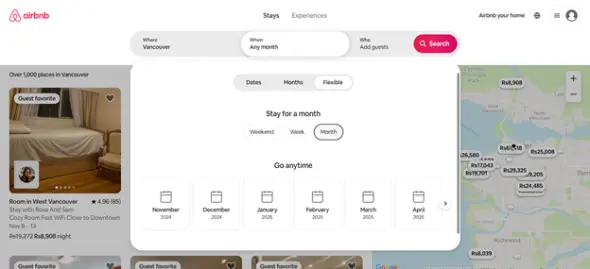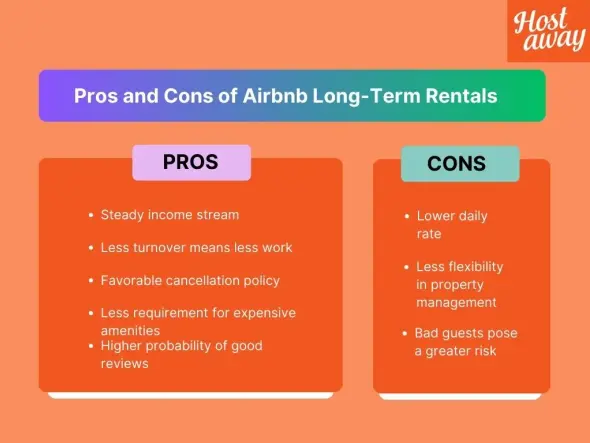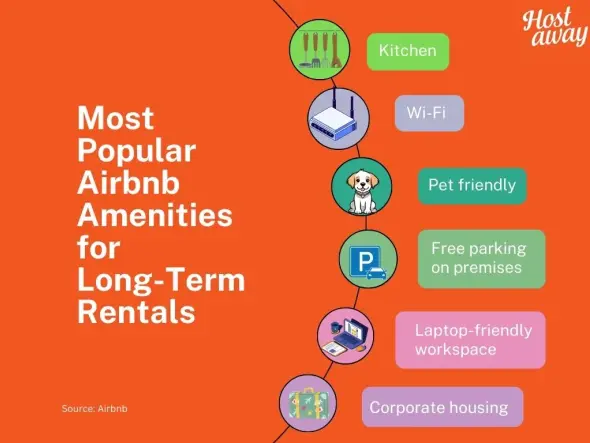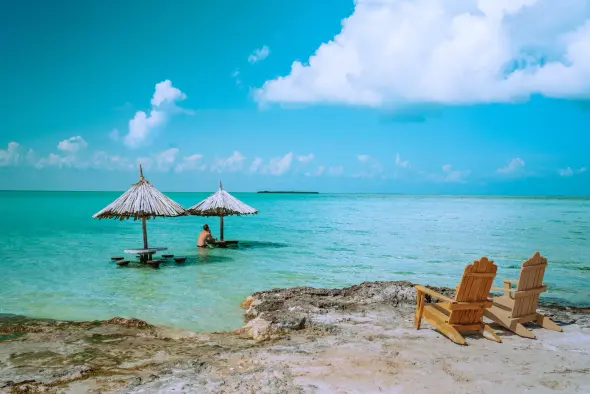Pros and Cons of Airbnb Long-Term Rentals for Hosts

Key Takeaways
Airbnb long-term rentals (28+ days) are a growing trend driven by remote work and travelers seeking extended stays.
These bookings can offer hosts a steady, predictable income and reduced turnover, but often come with lower nightly rates.
Long-term stays require different setup strategies, including updated listings, monthly discounts and adjusted reservation settings.
Managing extended stays effectively means catering to long-term guest needs, like strong Wi-Fi, full kitchens and pet-friendly options.
Hosts should understand local laws and tenant rights before committing and use screening tools and rental agreements to avoid potential issues.
Longer stays have been a growing segment on Airbnb since the pandemic, emerging as a viable alternative to the traditional short-term vacation. As people continue to work remotely, many are choosing Airbnb monthly stays, taking the opportunity to be closer to family or friends, or live in a big city.
Airbnb too is focusing on its long-term rental business with CEO Brian Chesky recently announcing that it is a key part of its growth strategy. According to him, long-term rental bookings now account for 17-18% of the company’s business, up from 13-14% before the pandemic.
For many hosts however the question remains: Should I allow Airbnb long-term rentals? Understanding this growing market can help you maximize your rental revenue and create a more stable income stream.
In this article we take a deep dive into what an Airbnb stay of 28 days or more entails, the pros and cons of long-term rentals and provide strategies for setting up your Airbnb listing to optimize bookings for extended stays.
What is an Airbnb Long-Term Rental?
Also known as an Airbnb monthly stay, a long-term rental on Airbnb is defined as a stay that is at least 28 days long.
How do Airbnb Long-Term Rentals Work?
Recognizing the potential of this market segment, Airbnb allows travelers to easily choose stay periods by a month. It has also introduced a dedicated Sublet section to tap into the corporate housing market.
For vacation rental property managers, Airbnb long-term bookings offer both unique opportunities and challenges in comparison to short-term rentals, as the needs and expectations of long-term Airbnb guests differ significantly from those of short-term travelers.

What Type of Airbnb Guests Prefer Long-Term Stays?
Airbnb monthly rentals are attractive to a variety of traveler segments. These include:
Holiday-makers with extended vacation days
Those taking a break from work or in between jobs
Pros and Cons of Long-Term Airbnb Rentals
Take into account both the pros and cons of allowing long-term stays on Airbnb when deciding if it is the right fit for you.
Pros | Cons |
Steady income stream – Predictable monthly revenue, even in off-season | Lower profitability – Long-term guests expect steep discounts, cutting into revenue |
Reduced guest turnover – Fewer check-ins/cleanings; less daily work | Reduced pricing control – Can’t adjust rates daily or capitalize on seasonal demand |
Host-friendly cancellation policies – Limited refund windows protect income | Legal risks – Long-term guests may acquire tenant rights, making eviction difficult |
Lower amenity expectations – Guests value comfort over luxury features | Risk of difficult guests – Bad long-term guests are much harder to remove than short-term ones |
Higher chance of positive reviews – More time to build rapport | Inflexible calendar – Listings are blocked for long periods, reducing availability for higher-paying stays |
Fewer reviews, slower momentum – Fewer bookings mean fewer opportunities to boost your listing performance | |
Less control over property – Fewer opportunities to inspect or access the space | |
Amenity wear and tear – Long-term guests may use appliances more heavily, increasing maintenance costs | |
May trigger tenant rights – Depending on location, long-term guests may gain legal protections |
What are some advantages of Airbnb long-term rentals?
1. Steady income stream
One of the main advantages of accepting long-term rentals on Airbnb is the ability to generate steady revenue, even during the off-season. With extended stays, hosts can enjoy a more predictable income, reducing the need for promotions and discounts or dealing with high turnover.
2. Reduced guest turnover
Lower guest turnover means less frequent cleaning, fewer check-ins and check-outs and ultimately, less work. Hosting long stay guests allows you to cut down on operational tasks, making it a less labor-intensive experience.
3. Beneficial cancellation policy
Airbnb's long-term cancellation policy options are favorable to hosts.
For instance, once a guest commits to a long-term stay, there are strict conditions for canceling, which ensures hosts are compensated for their time and availability.
4. Less expensive amenities
Most Airbnb guests booking long-term reservations are looking for a comfortable and cozy place where they can live and work rather than for big-ticket amenities like hot tubs and Jacuzzis. This means you don’t have to shell out as much to meet the expectations of long-term rental guests.
5. Potential for better reviews
With more time to build rapport with guests, there's a greater opportunity to receive positive reviews. Long-term guests often appreciate the sense of home and comfort they find during extended stays, leading to better ratings and reviews.
What are some key disadvantages of Airbnb long-term rentals?
1. Lower daily rate
While the overall income may be steady, the average daily rate (ADR) for Airbnb long-term reservations is often lower than for short-term stays. Typically, guests expect discounted rates from what you would charge a short-term rental guest. This can reduce your profitability per night compared to peak short-term reservations.
2. Less flexible property management
Because long-term stays last at least a month (or 28 days to be exact), there is no option to adjust your price by daily market conditions as you would for short-term rentals.
Long-term rental Airbnb hosts also have less flexibility in managing the property since guests occupy it for an extended period.
3. Potential issues with problematic guests
If you end up with a problematic guest, having them stay for an extended period can be a significant issue. Proper screening is essential to mitigate this risk, as evicting a long stay guest can be a challenging process depending on local laws.

How to Set Up Your Airbnb Listing for Long-Term Rentals
1. Update your listing description
Start by updating your Airbnb listing description to explicitly mention that you accept long-term rentals.
2. Update your availability settings
Update the availability settings in your Airbnb calendar to allow extended bookings. Here’s how:
Click Calendar
Select the listing calendar you want to change
Click Availability
Under Trip length, update your minimum and maximum nights. Set the minimum stay requirement to 28 nights or more.
Click Save
You can also create custom rules for your minimum night setting. For example, you can set a three-night minimum for check-ins on a Thursday vs. a one night minimum for other days. Here’s how:
Click Minimum nights
Click Customize by check-in day
Offer discounts for longer stays
3. Offer discounts
Offering discounts is a great way to attract long-term reservations on Airbnb. Weekly and monthly discounts are highlighted to potential guests in their Airbnb search results, which makes your listing more attractive compared to competitors.
Here’s how to set a discount on Airbnb:
Click Calendar
Select the listing calendar you want to change
Click Pricing and then click Discounts
Choose Weekly, Monthly or Trip length discounts
Enter your discount percentage and click Save
Consider offering a discount that aligns with your average occupancy rate. For example, if you have an average vacancy rate of 20%, offering a 20% discount can help fill those gaps while still meeting your income expectations.
4. Adjust reservation preferences
Updating your additional reservation preferences can help you meet the needs of long-term guests while also setting boundaries that align with your property management style.
Here are the additional settings in Calendar Availability to that you can change:
Advance notice
This allows you to set how much notice you need before each booking. Set an appropriate advance notice period so you can prepare for long-term guests.
Preparation time
This is the minimum time you need between bookings.
Your cleaners may be able to manage a full turnover in just 2 hours for a short-term rental guest but when a guest has stayed for a month, it is likely you will need much longer to get your vacation rental property ready for the next guest. Allocate extra time between bookings to conduct a deep clean.
Availability window
This setting determines how far in advance a guest can book a long-term reservation.
Unlike short-term stays, a late cancellation of a month-long stay can mean you are struggling to fill the vacant month. In combination with your Airbnb cancellation policy, the availability window allows you to set how far into the future a guest can book your Airbnb property.
Custom rule-sets
Airbnb hosts who own at least six listings on the vacation rental platform are allowed to create and edit custom rule-sets.
These Airbnb property managers can create rules to automatically adjust pricing at different times of the year, discount pricing for guests who book longer stays or trip length requirements.

How do Airbnb Payouts Work for Long-Term Rentals?
For Airbnb monthly rentals, payouts are structured differently than for short-term stays.
For Airbnb reservations that are 28 nights or more, the platform collects payment from guests in monthly installments. Here’s how it works:
Airbnb charges the long-term rental guest for the first month upfront. The first long-term rental payment is released to Airbnb hosts 24 hours after the guest is scheduled to check in.
The next payouts are made monthly, based on the reservation check-in date, until the end of the booking.
How long it takes an Airbnb host to get each payout however depends on the time taken to process the payment. This in term depends on your chosen payout method on Airbnb.
How to check the status of your monthly payment on Airbnb
All Airbnb hosts can check the status of their payments in their earnings dashboard.
How do monthly stay payouts work for new Airbnb hosts?
If you are a new host on Airbnb, the booking platform may hold the payout for 30 days after the first reservation is confirmed.
What is Airbnb's Cancellation Policy for Long-Term Rentals?
Long-term rentals on Airbnb are automatically subject to Airbnb's long-term cancellation policy.
You can choose between two options:
1. Firm long-term rental cancellation policy
Guests must cancel at least 30 days before their scheduled check-in date if they want to get a full refund. If they cancel less than 30 days before their check-in, you will be paid in full for all the nights they have stayed at your vacation rental property plus the cost of 30 additional nights.
If there is less than 30 nights left on the long-term reservation when an Airbnb guest cancels, you will be paid in full for all of the remaining nights.
2. Strict long-term rental cancellation policy
A stricter version of the former policy, Airbnb hosts who choose this option will only have to payout a full refund if the guest cancels within 48 hours of making the booking and the date of cancellation is a minimum of 28 days before the scheduled check-in date.
Guests who cancel after this period will be charged the full amount for all the nights they stayed at your vacation rental property and the amount of the next 30 nights remaining of the reservation. If, at the time of cancellation, there are less than 30 nights remaining, hosts will be paid the full amount for those remaining number of nights.

How to Optimize Your Airbnb Listing for Long-Term Rentals
1. Improve amenities for long-term guests
Long-term guests have different requirements compared to short-term travelers so enhance your property to cater to those needs and wants.
For example, guests staying for a month or more will expect a fully equipped kitchen so they can prepare meals, a reliable high-speed wi-fi connection, lots of extra storage space, a workspace, an iron, a washing machine, etc.
They may also expect to have a friend or partner over. If they bring their pets along, which most pet owners are likely to do, you will also have to cater to a cat or a dog for a longer period. Make sure your long-term booking listing caters to your guests’ requirements ahead of time and prepare for maintaining the space.
According to Airbnb, the most popular amenities for long stays are:
Kitchen
Wi-Fi
Pet-friendly
Laptop-friendly workspace
Free parking on premises
Corporate housing
Don’t forget to check the box for all these amenities on your Airbnb listing so your vacation rental property shows up when guests filter their searches by them.
2. Set long-term rental guest expectations
Create a manual of your house rules catering to long-term rental guests. Include clear instructions on how all the things they need for day-to-day living works. For example, how to dispose of trash or water the plants.
This will allow guests to adjust to their new and temporary living situation more easily.
If you're sharing the space with your guest, you should also set expectations about your interactions. You can define this in the Guest interaction section of the Title & description settings of your listing.
3. Connect with guests
Be available and support your guests during a monthly stay.
A guest is more likely to reach out for assistance during a long-term rental. Make sure to respond to their queries quickly and thoughtfully so they are not left unable to complete a chore an entire day because you didn’t respond.
An AI guest messaging automation tool can be very helpful.
4. Target your marketing to long-term guests
Long term rentals attract distinct types of guests, from digital nomads and college students to remote working families with pets. In the US alone, one out of five workers are working remotely and estimated 32.6 million Americans are forecast to be working remote workers by 2025. Meanwhile, 16% of companies worldwide are fully remote.
Meanwhile, long-term Airbnb bookings were most popular among older adults (aged 60-90), with 28% of stays longer than 28 days booked by them. The second largest share of nearly 25% was claimed by 18-24 year-olds.
Tailor your marketing strategy to appeal to these specific groups. You can also consider niche vacation rental booking websites that may better cater to specific audiences like traveling workers looking for corporate housing.

5. Add a guidebook for monthly stay guests
Include a guidebook that is geared towards the long-stay guest. Make sure you include useful tips such as the best spots to purchase groceries, great places to exercise or where they can walk their dog safely.
How to Stay Compliant and Prevent Squatters with Airbnb Long-Term Rentals
Before committing to long-term rentals on Airbnb, it's essential to consider local laws regarding short-term and long-term rentals.
Many cities have specific definitions and restrictions on what constitutes a short-term versus a long-term rental. For example, some locations may define short-term rentals as stays of fewer than 30 continuous nights, while others may have additional regulations regarding extended stays.
In some areas, long-term guests may acquire tenant rights, which can complicate matters if you need them to leave. Squatters' rights, or adverse possession laws, vary significantly between jurisdictions and could present significant challenges for Airbnb hosts. It's advisable to be well-versed in local regulations and consult with a legal professional to understand how tenant rights and eviction laws apply to long-term Airbnb guests in your area. This knowledge will help protect your property and avoid potential legal complications.
How to Avoid Bad Long-Term Rental Guests on Airbnb
Screen guests
The best way to deal with bad guests is to prevent them from staying at your Airbnb property in the first place. Having a bad guest stay for four weeks is much harder to deal with and can cost you so much more than one who’s only there for 2 days.
Look at potential guests' reviews from other hosts and ask additional questions to ensure a good fit. The best and easiest way to screen Airbnb guests is to use a screening tool like Authenticate or Autohost.
Use a short-term rental agreement
Having a rental agreement for long-term guests helps set clear expectations and protects both parties. Include details regarding house rules, payment terms and any other guidelines that will help both you and your guests understand their responsibilities and protect you from liability and other hosting risks.
Making the Choice: Is Long-Term Hosting Right for You?
Airbnb monthly rentals represent a significant growth opportunity for hosts willing to adapt to this emerging market, providing a unique chance to attract reliable, longer-term guests and foster deeper connections. The decision to allow long-term Airbnb rentals however depends on your personal preferences and your property's unique characteristics.
By thoughtfully setting up your listing, adjusting your amenities and screening guests effectively, you too can capitalize on the growing demand for long-term stays, if you consider it to be a worthwhile strategy to explore for your hosting setting.
Frequently Asked Questions
1. If I switch to long-term stays, can I still host short-term guests in between?
Yes, but only if you manage your calendar intentionally. For example, if a long-term guest checks out mid-month, you can open the remaining dates for short-term bookings. Just be aware that cleaning and reset time may be longer after a long stay, so plan accordingly.
2. Do long-term guests increase the risk of being classified as a “landlord” legally?
Potentially, yes. In many jurisdictions, guests who stay 28+ days can gain legal rights similar to tenants — even if the stay was booked through Airbnb. This can make it more difficult and legally complex to remove them. Always check your local landlord-tenant laws before accepting extended stays.
3. Can I screen long-term guests more strictly than short-term ones?
Yes and you absolutely should. For long-term stays, it’s reasonable to ask pre-booking questions about employment, purpose of stay, or length of visit. You can also use third-party guest screening tools like Autohost or Safely to reduce risk.
4. Are there tax or licensing implications for long-term stays that differ from short-term ones?
Yes. Some cities or states differentiate between short- and long-term rentals in their tax structure. In some places, stays over 30 days may be exempt from transient occupancy tax — but may instead fall under rental housing laws. Consult a local tax advisor or attorney to clarify your obligations.
5. Will switching to long-term bookings hurt my Airbnb ranking or visibility?
Not necessarily, but it could affect your momentum. Airbnb’s algorithm favors active listings with frequent reviews and bookings. Since long-term stays reduce booking volume, you might rank lower over time compared to hosts who churn weekly guests. If maintaining visibility is a priority, a hybrid strategy (off-season long stays + peak-season short stays) could help.
Ready to find out how Hostaway can transform your business?
